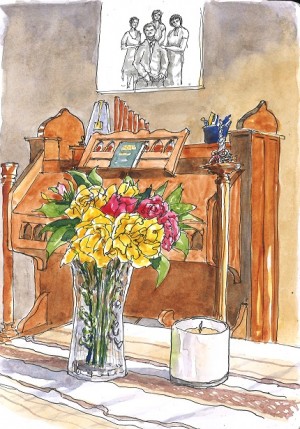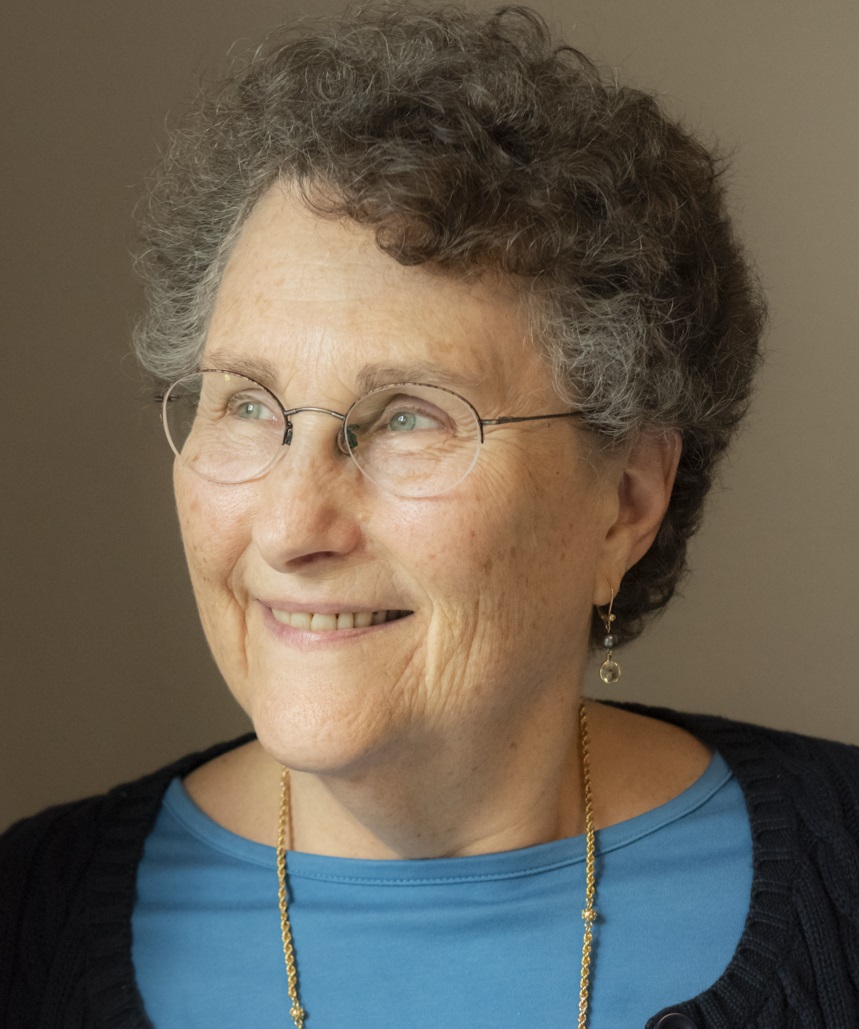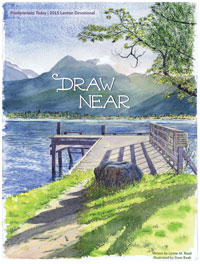Quotations I love: Memory
Lynne Baab • Thursday April 15 2021

“Memory is many things. . . . It is a call to resolve in us what simply will not go away.”
—Joan Chittister (born 1936), American Benedictine nun, theologian, author, and speaker
For most of my adult life, I would have read Joan Chittister’s words a certain way. For me, what wouldn't go away in my memories was pain, and I would have said we must face into pain from our past in in the company of others. I would have said that the unresolved memories in us that keep coming up should be dealt with in inner healing prayer, therapy/counseling/coaching, and in vulnerable conversations with family members and friends.
All of those strategies have been extremely helpful to me. My first inner healing experience was 34 years ago, and my most recent was 2019. Inner healing prayer has brought me insights about my family of origin and healing from some of the pain I experienced. My first therapy experience was 30 years ago, and therapy has been a helpful and significant support over many of the years since then. In the past two years, I’ve had two coaches who have been extremely helpful (one each year). Therapy/counseling/coaching has brought me insight, healing, and productive habits.
I am quite sure that many of my friends and some family members would say that I have no trouble talking about painful memories; I have expected those wonderful listeners to provide support and encouragement. I have looked to them to be sounding boards. Family members and friends who have been willing to listen have brought me insight, healing, new habits, and a sense of being loved. I am so grateful for their care and love.
I have dipped into Brene Brown’s popular work on vulnerability (her Ted talk and book), and I see clearly that I don’t need to be more vulnerable. My vulnerability has made my books and speaking accessible. I’m quite sure it has tired out my friends, while also giving them valuable permission to be vulnerable themselves. After a lifetime of vulnerability, I am currently being challenged by God to focus on a different set of memories.
In the Bible, memory appears to be a mostly conscious choice of what we do with our brains. “I will call to mind the deeds of the Lord; I will remember your wonders of old,” the psalmist writes (Psalm 77:11). Memory is associated with remembering what God has done in order to engage in praise of God. In addition, various psalm writers ask God to remember us and our needs, or they thank God for remembering us: “He has remembered his steadfast love and faithfulness to the house of Israel” (Psalm 98.3).
Memory is also related to choosing to think about people in need. The writer to the Hebrews exhorts: “Remember those who are in prison, as though you were in prison with them; those who are being tortured, as though you yourselves were being tortured” (Hebrews 13:3). Paul describes his conversation with the leaders of the church in Jerusalem: “They asked only one thing, that we remember the poor, which was actually what I was eager to do” (Galatians 2:10).
I have always taken comfort in passages that give me permission to remember sad things. The Jews in exile in Babylon sang: “By the rivers of Babylon—there we sat down and there we wept when we remembered Zion” (Psalm 136:1). I have remembered and wept. Now it seems God is calling me to use my memory, at least part of it, to remember what God has done in my life so I can trust that God will continue guide me and care for me into the future. I have barely begun to explore how God might be calling me to use my memory to focus on people in need.
Perhaps you have tried to discipline your memories of pain. Perhaps you have pushed them away, majoring in trying to be positive and optimistic. Perhaps you need to read Joan Chittister’s words as a call to explore the painful memories that will simply not go away. If so, I recommend vulnerability with family members and friends who are good listeners. I recommend inner healing prayer and therapy/counseling/coaching. Perhaps Brene Brown might provide some helpful guidance.
Perhaps you are like me, and God is calling you to a slight shift in emphasis, away from exploring painful memories to nurturing memories of God’s goodness and faithfulness to you, to those you love, to Christians throughout history, and to the wider church today. Notice I said “slight emphasis.” I have no intention of stopping bringing pain to God, friends, and other helpers. But I want to balance my memories of pain with memories of God’s goodness.
O give thanks to the Lord, call on his name,
make known his deeds among the peoples.
Sing to him, sing praises to him,
tell of all his wonderful works. . . .
Remember the wonderful works he has done,
his miracles, and the judgements he uttered. . . .
Remember his covenant for ever,
the word that he commanded for a thousand generations. . . .
Sing to the Lord, all the earth.
Tell of his salvation from day to day.
Declare his glory among the nations,
his marvellous works among all the peoples.—I Chronicles 16:8, 9, 12, 15, 23, 24
Next week: The image of God in humans. Illustration by Dave Baab. I invite you to sign up below if you’d like to receive an email when I post on this blog.
Highlight on one of my books — A Renewed Spirituality: Finding Fresh Paths at Midlife, now available for kindle. When I did the interviews for this book, the vulnerability of the people I interviewed was astonishing, and the book was shaped by what I heard from people at midlife. Truly our stories about our own journeys can be helpful to others.
Next post »« Previous post
Subscribe to updates
To receive an email alert when a new post is published, simply enter your email address below.

Lynne M. Baab, Ph.D., is a teacher and writer. She has written numerous books, Bible study guides, and articles for magazines and journals. Lynne is passionate about prayer and other ways to draw near to God, and her writing conveys encouragement for readers to be their authentic selves before God. She encourages experimentation and lightness in Christians spiritual practices. Read more »
Lynne is pleased to announce the release of her book on grief and gratitude, designed to help people grieving from anything, including the pandemic, while also desiring to notice God's good gifts. Two Hands: Grief and Gratitude in the Christian Life is available in paperback, audiobook, and for kindle. Lynne's 2018 book is Nurturing Hope: Christian Pastoral Care for the Twenty-First Century, and her best-selling book is Sabbath-Keeping: Finding Freedom in the Rhythms of Rest (now available as an audiobook as well as paperback and kindle). You can see her many other book titles here, along with her Bible study guides.
Lynne recently spoke about empathy and also about bringing spiritual practices to life.
Lynne was interviewed recently for the podcast "As the Crow Flies". The first episode focuses on why listening matters and the second one on listening skills.
Here are two talks Lynne gave on listening (recorded in audio form on YouTube): Listening for Mission and Ministry and Why Listening Matters for Mission and Ministry.
"Lynne's writing is beautiful. Her tone has such a note of hope and excitement about growth. It is gentle and affirming."
— a reader
"Dear Dr. Baab, You changed my life. It is only through God’s gift of the sabbath that I feel in my heart and soul that God loves me apart from anything I do."
— a reader of Sabbath Keeping
Subscribe
To receive an email alert when a new post is published, simply enter your email address below.
Featured posts
- Drawing Near to God with the Heart: first post of a series »
- Quotations I love: Henri Nouwen on being beloved »
- Worshipping God the Creator: the first post of a series »
- Sabbath Keeping a decade later: the first post of a series »
- Benedictine spirituality: the first post of a series »
- Celtic Christianity: the first post of a series »
- Holy Listening »
- A Cat with a Noble Character »
- Welcome to my website »
Tags
Archive
- April 2024 (4)
-
March 2024 (5)
- Friendship, loneliness, and prayer: Praying about distractions from empathy
- Friendship, loneliness, and prayer: Praying to keep empathy flowing
- Friendship, loneliness, and prayer: Everyday initiative
- Friendship, loneliness, and prayer: Praying for guidance for ending conversations
- Friendship, loneliness, and prayer: Reflecting on the series
- February 2024 (4)
- January 2024 (2)
-
December 2023 (6)
- Friendship, loneliness, and prayer: Initiating
- Friendship, loneliness, and prayer: Praying about listening roadblocks
- Friendship, loneliness, and prayer: Praying to love the poverty in our friends
- Friendship, loneliness, and prayer: Praying for “holy curiosity”
- Friendship, loneliness, and prayer: Praying for “holy listening”
- Friendship, loneliness, and prayer: Praying to give affection extravagantly
- November 2023 (4)
-
October 2023 (5)
- Friendship, loneliness and prayer: A listening skill with two purposes
- Friendship, loneliness, and prayer: Saying “thank you” to friends
- Friendship, loneliness, and prayer: One more way reflecting helps us
- Friendship, loneliness, and prayer: Lessons from two periods of loneliness
- Friendship, loneliness, and prayer: Types of reflecting, a listening skill
- September 2023 (4)
- August 2023 (4)
- July 2023 (5)
- June 2023 (3)
- May 2023 (6)
- April 2023 (4)
- March 2023 (4)
- February 2023 (4)
- January 2023 (4)
- December 2022 (5)
- November 2022 (1)
- October 2022 (5)
- September 2022 (5)
-
August 2022 (6)
- Draw near: Confessing sin without wallowing
- Draw near: A favorite prayer about peace, freedom, and much more
- Drawing near with Desmond Tutu: God’s love is the foundation for prayer
- Draw near: Worshipping God with Desmond Tutu
- Draw near: Yearning, beseeching and beholding with Desmond Tutu
- Draw near: Praising God with Desmond Tutu
- July 2022 (2)
- June 2022 (6)
- May 2022 (5)
- April 2022 (6)
- March 2022 (5)
- February 2022 (4)
- January 2022 (3)
- December 2021 (5)
- November 2021 (4)
- October 2021 (5)
- September 2021 (4)
- August 2021 (4)
- July 2021 (4)
- June 2021 (4)
- May 2021 (4)
- April 2021 (5)
- March 2021 (4)
- February 2021 (4)
- January 2021 (4)
- December 2020 (5)
- November 2020 (3)
- October 2020 (5)
- September 2020 (4)
- August 2020 (4)
- July 2020 (5)
- June 2020 (4)
-
May 2020 (4)
- Spiritual diary of sheltering in place: The lifeline of separating thoughts from feelings
- Spiritual diary of sheltering in place: The lifeline of welcoming prayer
- Spiritual diary of sheltering in place: a kite string as a lifeline
- Spiritual diary of sheltering in place: The lifeline of God’s distant future
-
April 2020 (7)
- Spiritual diary of self-isolation: the lifeline of God’s constancy
- Spiritual diary of sheltering in place: The lifeline of accepting my place as a clay jar
- Spiritual diary of sheltering in place: the lifeline of memories
- Spiritual diary of sheltering in place: the lifeline of “Good” in “Good Friday”
- Spiritual diary of sheltering in place: The lifeline of “easier does not mean easy”
- Spiritual diary of sheltering in place: The lifeline of nature
- Spiritual diary of sheltering in place: the lifeline of God’s voice through the Bible
-
March 2020 (7)
- Important anniversaries in 2020: The first Earth Day in 1970
- Important anniversaries in 2020: Florence Nightingale was born in 1820
- Spiritual diary of self-isolation: Weeks 1 and 2
- Spiritual diary of self-isolation: God's grace as a lifeline
- Spiritual diary of self-isolation: The lifeline of limits on thoughts
- Spiritual diary of self-isolation: Wrestling with God for a blessing
- Spiritual diary of self-isolation: responding to terror by listening to Jesus voice
- February 2020 (4)
- January 2020 (5)
- December 2019 (4)
- November 2019 (4)
- October 2019 (5)
- September 2019 (4)
- August 2019 (5)
- July 2019 (4)
- June 2019 (4)
- May 2019 (5)
- April 2019 (4)
- March 2019 (4)
- February 2019 (4)
-
January 2019 (5)
- Nurturing friendships in a cellphone world: Jesus as Friend
- Nurturing friendships in a cellphone world: Friendship with Christ and friendship with others
- Nurturing friendships in a cellphone world: Who is my neighbor?
- Nurturing friendships in a cellphone world: Friendship as action
- Nurturing friendships in a cellphone world: Hymns that describe friendship with God
- December 2018 (3)
-
November 2018 (5)
- Connections between the Bible and prayer: Sensory prayer in Revelation
- First post in a new series: Nurturing friendships in a cellphone world
- Nurturing friendships in a cellphone world: Strong opinions and responses
- Nurturing friendships in a cellphone world: My conversation partners about friendship
- Nurturing friendships in a cellphone world: Two views about communication technologies
- October 2018 (4)
- September 2018 (4)
-
August 2018 (5)
- Providing Christian Care in Our Time
- Providing Christian care in our time: Seven trends in pastoral care today
- Providing Christian Care in Our Time: Skills for Pastoral Care
- Providing Christian care: The importance of spiritual practices
- First post in a new series: Connections between the Bible and prayer
- July 2018 (4)
- June 2018 (4)
- May 2018 (5)
- April 2018 (4)
- March 2018 (5)
- February 2018 (4)
- January 2018 (4)
- December 2017 (5)
- November 2017 (4)
- October 2017 (4)
- September 2017 (5)
- August 2017 (4)
- July 2017 (4)
- June 2017 (4)
-
May 2017 (5)
- My new spiritual practice: Separating thoughts from feelings
- My new spiritual practice: Feeling the feelings
- My new spiritual practice: Coping with feelings that want to dominate
- My new spiritual practice: Dealing with “demonic” thoughts
- My new spiritual practice: Is self-compassion really appropriate for Christians?
- April 2017 (4)
- March 2017 (5)
- February 2017 (4)
- January 2017 (4)
- December 2016 (5)
- November 2016 (4)
- October 2016 (4)
- September 2016 (5)
- August 2016 (4)
- July 2016 (4)
- June 2016 (4)
- May 2016 (5)
- April 2016 (4)
- March 2016 (5)
- February 2016 (4)
- January 2016 (4)
- December 2015 (4)
- November 2015 (4)
- October 2015 (5)
- September 2015 (4)
- August 2015 (4)
- July 2015 (4)
- June 2015 (4)
- May 2015 (4)
- April 2015 (6)
- March 2015 (4)
- February 2015 (4)
- January 2015 (4)
- December 2014 (5)
- November 2014 (4)
- October 2014 (4)
- September 2014 (4)
- August 2014 (5)
- July 2014 (4)
- June 2014 (7)





















